Making life whole again
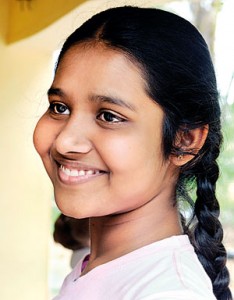
Rashmini Pramodya: Her beaming face says it all
The whining sound of a tree trunk being sawed greets us long before we see Samantha Rohana, 37, in Gallewa, off the dry and dusty beaten track from the town of Maho in the Kurunegala district.
Samantha who has returned home to his wife and four children for a few days from his ‘job’ as a labourer at a construction site in Dambulla, is using a chain-saw to cut-up planks from a felled kohomba tree. His neighbour has promised him a few extra hundred rupees which would help keep hunger away from his young family.
It is only as he walks us to his half-built home that the “difference” becomes obvious. Samantha is an amputee who has been fitted with a limb to regain not only his mobility but also his responsibility as the breadwinner of his family.
He is among thousands of men, women and children – including soldiers and former women and child fighters of the Liberation Tigers of Tamil Eelam (LTTE) – who have been taken under the far-reaching canopy of the Meththa Rehabilitation Foundation, with its motto – ‘Waste not, want not’.
The causes of the amputations after which the Foundation has supported people include diabetes, road traffic accidents, other accidents, war, vascular and congenital issues, malignancies and infections. Eighty-four percent of these amputations are preventable.
Explaining that he does “ahuwechcha wedak” (whatever work comes his way), Samantha is doing ath-weda at a construction site.
Face clouding over, Samantha recalls the morn when as a carefree 22-year-old he was making his way along a niyara to the wela (paddyfields) in his village in Polonnaruwa when there was a blast and his life changed forever.
He had tripped on a maru wela (trigger-line), setting off a trap-gun laid for wild animals by cultivators. All alone, amid the excruciating pain, he was able to call his father and then drag his shattered left leg about half-a-kilometre to be admitted to hospital nearly two hours later. There was no option but to amputate his leg below the knee.
Many of the life-stories are different but at the same time tragically similar. For the 24 former Tiger women and child fighters the crude amputations had been performed on the battlefield, the limbs sawed off and stitched up, resulting in lots of complications.
For pretty, 14-year-old Rashmini Pramodya, however, it was from birth that she had leg issues. “I used to fall a lot,” she smiles shyly, adding that she was dependent on crutches. A right knee disarticulation (an amputation between bone surfaces) was done. Now with a limb from Meththa she does not miss even a day’s lessons, climbing with ease onto the pillion of her farmer-father’s motorcycle as she wishes to become a teacher of science, her favourite subject.
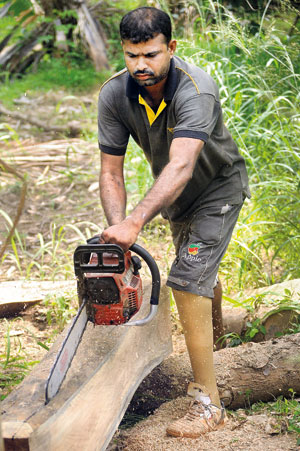
Samantha: It’s a daily grind, but at least with his prosthesis he can find work to keep his family from starving. Pix by Amila Gamage
Riding motorcycles is also the craze of Lahiru Umayangana, 16, in Meegolla, who was born without his left leg from below the knee. With his special leg, a prosthesis manufactured with silicon technology along with a silicon-liner imported all the way from Germany, he helps his father who is a cultivator whenever he takes stuff for sale to the pola, is a regular at a gym close by and loves to ride about on his motorcycle, leaving his mother wringing her hands in dismay.
Many lives saved from the brink of despair encompassed by a fabric with a single thread running through it.
And the common thread being Meththa, before our ‘home-visits’ to Samantha, Rashmini and Lahiru, we spend the whole morning at its main ‘Fabrication Unit & Clinic’ at Maho, having turned right at Daladagama Junction off the Kurunegala-Anuradhapura Road.
This is the very heart of the Foundation where those needing limbs are seen and the components manufactured to fit each and every person. While this unit was established on January 4, 2014, it feeds the Mankulam centre, which was opened on May 5, the same year.
“People seek out the unit having either been referred by doctors who have been students of Founder Dr. B. Panagamuwa or simply through word-of-mouth, says Chief Prosthetist, Orthotist and Physiotherapist, Nuwan Chanaka Gunarathne. “Word spreads fast through the amputated community.”
He then introduces us to what the different terms mean, as we take a walk around the fabrication unit. A ‘prosthesis’ is fitted for a missing part of a person’s body such as a hand or a leg. An ‘orthosis’ is a device, ranging from a simple splint to a knee, ankle, foot or hip brace, which supports a disabled part of a person’s body.
“This is not a usual clinic,” says Mr. Gunarathne and we see not only the patience but also the efforts at perfection with which the 13-member team carry out their work.
Here we meet 25-year-old Saman Ratnasiri from Alawwa, again a trap-gun victim who has tried several other “kruthima pada” (artificial limbs). It is at the Meththa Clinic & Fabrication Unit that he has found the “right fit”. A graphic designer, he hopes to tie the knot very soon.
Different varieties of prostheses are the forte of the centre, with Mr. Gunarathne being particularly proud of the one being worn by Rashmini after knee disarticulation. It is only at Meththa that they can manage and rehabilitate this type of amputation.
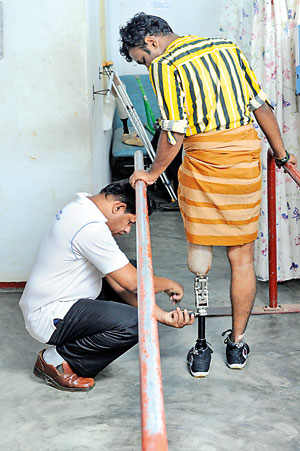
A last -minute adjustment to a new limb for Saman Ratnasiri, another trap gun victim
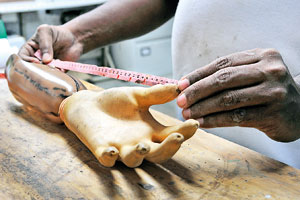
Hands on work at the unit
| Meththa Founder on how it all started
It is after that duty and the children and their parents have been seen off at the Fort Railway Station to go back home to Vavuniya and Mullaitivu that Meththa Founder Dr. B. Panagamuwa talks to us about this mission he along with many like-minded people, including Sinhalese and Tamils, is on. This British-Sri Lankan rehabilitation medicine doctor who retired prematurely to provide a service to Sri Lankans, is supported by a retired British prosthetist. The boy has Proximal Femoral Deficiency in its worst possible form, says Dr. Panagamuwa, with only a very rudimentary right thigh bone, no hip or knee joint and a sliver of bone for his lower leg. His foot has a few rudiments of bone and is grossly deformed, while the whole leg is flail. Dr. Panagamuwa had met the boy at the Mankulam Centre, hopping with a pair of oversized crutches, a year ago, while he had seen the girl at the Mannar Hospital when she was just about two years old, with gross club foot deformities, as a result of partial paralysis in her legs. She was also suffering with enormous deep neuropathic ulcers in both feet caused by friction with the floor due to crawling, dragging her feet along. Having examined the children and trying out various measures, he had come to the conclusion that the only option for the boy was amputation of the flail leg at hip-level and fitting him with an artificial leg to enable him to walk unaided. “This condition is very rare,” says Dr. Panagamuwa, pointing out that many surgeons may not have seen it at all. “We are familiar with it because we provide artificial limbs for a wider population. I have three such people whom I manage at Maho and another at Mankulam. The surgery for this child is simple but he wanted it to be trouble-free and this is why he brought him to Colombo to seek the best advice. The operation is scheduled for January 31. X-rays of the girl, meanwhile, had found that the bones beneath the ulcers were eroded. For six years, her parents and Dr. Panagamuwa “struggled” to get the wounds to heal, but to no avail. Last year the wounds got infected again. “This was really sad,” says Dr. Panagamuwa and once again amputations of both deformed feet are the only answer for the proper development of this child. Dr. Panagamuwa is planning to return to Sri Lanka during the difficult period for this needy family from January 30 to February 14, when the amputations will be performed in Colombo. This is the Meththa Founder who while working at the Birmingham West Midlands Rehabilitation Centre, the biggest in the United Kingdom (UK) in the early 1990s, saw wheelchairs, artificial limbs and much more “just dumped into the bin”. He requested the centre to give him these good-quality used prosthetic limb components and rehabilitation equipment, transported them to his garage, loaded them onto a van, drove up to London from Birmingham and shipped them, at his own cost, to the Ranaviru Sevana of the army and the Colombo Friend-in-Need Society. Then his friends joined him and chipped in, forming an informal group of Sri Lankans in Birmingham. Facilitated by several independent prosthetic service provider companies, the components were collected, sorted and shipped to Sri Lanka using funds donated by the Foundation’s members. These components were then recycled into modern artificial limbs for amputee combatants as well as for civilians. “We had the means to do it and there was a great need for it. So we did it,” is Dr. Panagamuwa’s simple logic……..and that is how Meththa (which means loving kindness) Foundation was born in 1994. Next the Foundation suggested to the army that it should buy a bus which it would equip so that services could be provided at the doorstep of the soldiers in need living in far away areas. With the cessation of hostilities in the north, the Foundation seized the opportunity to serve amputee people in the Wanni by launching a mobile service, with Health Ministry approval, in July 2009. This was followed by a stand-alone artificial limb and appliance centre in a disused ward at the Mannar General Hospital, equipped using donations collected in the UK. Adopting an open-access policy and funded mainly by the Sri Lankan Tamil diaspora in the next five years, this centre provided more than 1,500 modern artificial limbs and appliances to people from all communities, free of charge. A mobile workshop was also assembled in a modified motor coach to provide an outreach service to amputees living in remote areas. Next the two modern clinics and workshops at Maho and Mankulam were set up in 2014, with Mannar downgraded to satellite status. The work of the Foundation is pioneering and innovative. “An active research and development programme has enabled production of a modular highly adjustable trans-tibial prosthetic system. All its components can be manufactured locally at a fraction of the current UK costs, eliminating dependence on foreign components for below knee amputees,” says Dr. Panagamuwa, adding that a modular knee joint has been prototyped and is to be field-tested soon. A limited service is also provided for neuro-disabled children with impaired posture and mobility. He sees this service as a great opportunity at reconciliation. Nearly 40% of the Foundation’s services are to the war-injured in the Wanni, a major proportion of the funds for this service are by the Tamil diaspora, while the services are led by Sinhala professionals and technicians with support from friends and colleagues in the UK. Therefore, it is a “good model” for building bridges and friendship between the communities, adds Dr. Panagamuwa. A hand for a limb A strong plea goes out to international donors, local businesses and corporates and benevolent people to support those who need limbs by donating whatever they can to the Meththa Rehabilitation Fund. Donations may be sent to: The Meththa Rehabilitation Foundation Account No. 003011252121 at the Hatton National Bank, Cinnamon Gardens Branch. So far the Foundation has helped nearly 4,000 beneficiaries in Sri Lanka with nearly 1,400 limbs and 1,400 repairs of limbs. For more information, please access www.meththafoundation.org.uk or e-mail: meththafoundation maho@gmail.com |



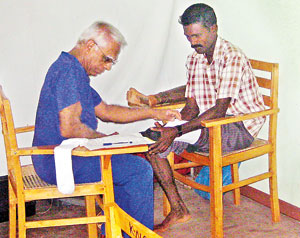 He hired a van and brought two children, a 10-year-old boy and an eight-year-old girl, along with their parents all the way from the north to see a well-known Orthopaedic Surgeon in Colombo.
He hired a van and brought two children, a 10-year-old boy and an eight-year-old girl, along with their parents all the way from the north to see a well-known Orthopaedic Surgeon in Colombo.